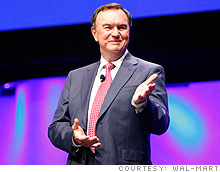Wal-Mart CEO: 'Our customers will stay with us'
Citing a 'new normal' in shopping behavior, Duke promises shareholders that the discounter will not lose customers even after economy rebounds.
 |
| Actress and singer Miley Cyrus performing at Wal-Mart's annual shareholder meeting on Friday. |
 |
| Wal-Mart CEO Mike Duke said the recession has created a "new normal" in terms of shopping behavior. |
NEW YORK (CNNMoney.com) -- With Hannah Montana and the newest American Idol in the house, Wal-Mart's CEO touted the retailer's improved performance at the annual shareholder meeting Friday, saying he expects new customers to stick around even after the recession is over.
"Our customers will stay with us when this economy turns around. I promise you that," Mike Duke told the thousands of attendees at the Bud Walton Arena in Fayetteville, Ark.
Friday's gathering marked the first shareholder meeting as CEO for Duke, who took over the reins from former CEO Lee Scott on Feb. 1.
Wal-Mart once again trotted out some big starpower at the gathering. Besides "Hannah Montana" star Miley Cyrus -- who will launch a new clothing line at the story -- and recent "Idol" winner Kris Allen, actor Ben Stiller and former basketball star Michael Jordan were in attendance.
Rally cry: The meeting began with executives' rally cry of "Who's time is it? It's Wal-Mart time."
"Winning feels good, doesn't it? Eduardo Castro-Wright, vice chairman of Wal-Mart Stores, asked
That's because while most of its peers are struggling to survive in a recession, Wal-Mart (WMT, Fortune 500), the world's largest retailer with annual sales of more than $400 billion, is one of few merchants that's actually boosted its market share.
Not only are Wal-Mart's sales at its stores open at least a year -- a measure known as same-store sales -- increasing during the downturn, it's also registering an uptick in the number of people shopping at its stores as more consumers across all income levels shop for its low-priced products.
According to sales tracker Thomson Reuters, Wal-Mart's same-store sales have risen 3.4% so far this year. By contrast, there's an average 4.6% decline in the firm's same-store sales index for 30 large retail chains, including Target (TGT, Fortune 500), J.C. Penney (JCP, Fortune 500) and Macy's (M, Fortune 500).
"Our results are loud and clear. We have improved our comparable sales again and again," Castro-Wright said. "For five consecutive quarters we have had better same-store sales growth than the market."
That trend, however, has not yet helped boost Wal-Mart's shares. Wal-Mart's stock has shed 9.3% of its value so far this year and has lost about 12% of its value over the past 12 months.
Wal-Mart also announced a new program to repurchase $15 billion of its shares. The plan replaces a two-year-old $15 billion repurchase plan that had bought $11.6 billion in stock.
New "normal" in shopping behavior: One concern, according to industry analysts, is whether or not Wal-Mart will be able to hold on its new customers when the economy rebounds.
Craig Johnson, president of retail consultant Customer Growth Partners, said two of Duke's biggest challenges will be how to retain the "new Wal-Mart Moms" it has gained over the past year and identifying its next major growth engine versus incremental growth opportunities over the next decade.
Duke, who headed Wal-Mart's international operations before taking the reins as CEO, indicated his company is ready for the challenge.
"We are not going back," he said. "I do believe that this economic crisis worldwide has brought a fundamental shift in consumer behavior.
"There is a 'new normal,' in which people want to save money and are getting smarter about saving money," he added. "People appreciate the values at Wal-Mart."
He also cautioned against becoming complacent. "This is not a time to slow down and take comfort in our success," Duke said." We need to be obsessed with understanding customers however they shop, whether it's on a mobile phone, a laptop, or in a local store."
"We have to conduct ourselves not as a giant but as a nimble and innovative competitor in every market," he said. "So this is not a time to slow down."
Employee plans: In addition to comments about Wal-Mart's business performance, Castro-Wright said the retailer was going to focus on improving competitive pay and benefits for its workers.
As the nation's largest private-sector employer, the company employs 1.45 million workers in the United States and more than 2 million workers globally in 16 countries.
On Thursday, the retailer said it plans to hire more than 22,000 new workers this year for its domestic stores.
However, Wal-Mart continues to come under fire from its critics, including labor unions, for its pay and benefits policies.
Castro-Wright said Wal-Mart will implement a "new diversity strategy" that puts more women and people of color in leadership positions. Currently, about 40% of the company's regional general managers and senior vice presidents are people of color and more than 20% are women, he said.
"How can we build a 21st century workforce? We may not find all the answers, but we will lead," he said.
The annual meeting concluded with shareholders re-electing all 15 of Wal-Mart's board of directors. Six shareholder proposals, including one making executive compensation tied to performance and another involving recognition of gender identity, were defeated. ![]()

